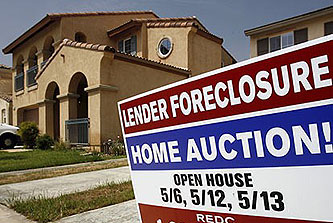Fannie Mae and Freddie Mac — now owned by you, the taxpayer! — have foreclosed on lots of homes. Those foreclosed homes act as a drag on the housing market, but Fannie and Freddie are reluctant to just get rid of them once and for all by offering them in bulk at rock bottom prices. Why? Because  that would cause us, the taxpayers, to lose even more money than we already have on Fannie and Freddie.
that would cause us, the taxpayers, to lose even more money than we already have on Fannie and Freddie.
So now the Obama administration is “seeking investors’ ideas” on a new proposal to rent out the homes instead of keeping them on the market:
One proposal would sell packages of hundreds or thousands of foreclosed properties in bulk to investors that agree to rent them out. That approach is preferred by the Department of Housing and Urban Development, which is taking back properties as defaults mount on loans backed by the FHA.
Another approach would let investors enter joint ventures with Fannie or Freddie to invest in a pool of converted rental homes. A national property-management business would handle day-to-day landlord responsibilities. Investors would pay for rehabbing and maintaining properties and would share revenue from monthly rental income and the ultimate sale of the property. Such a joint venture would be modeled on the Resolution Trust Corp., which sold failed banks’ assets in the early 1990s.
Jared Bernstein thinks this is an idea worth trying, and that makes me loath to admit that I don’t get this. But….I don’t get it. Right now, investors are free to buy packages of foreclosed properties any time they want and then do whatever they like with them. Sell them, rent them, demolish them, whatever. The problem is that Fannie and Freddie are asking too high a price so no one is interested.
So what changes under this new proposal? Well, we’re going to put a new restriction on what investors can do with their foreclosed properties: they’ll only be allowed to rent them. What’s more, apparently there will be some additional regulations to make sure that investors who participate in this plan will be good landlords. But restrictions and regulations make the properties less valuable, no? So investors will not only remain unwilling to pay Fannie and Freddie’s asking price, they’ll be even less willing than before because the properties now have additional encumbrances on them.
I just don’t get this. This plan would presumably require F&F to offer their foreclosed homes at fire sale prices. But if we’re willing to do that, why not just offer them at fire sale prices and be done with it? Why waste time with the rental plan? What am I missing here?


















